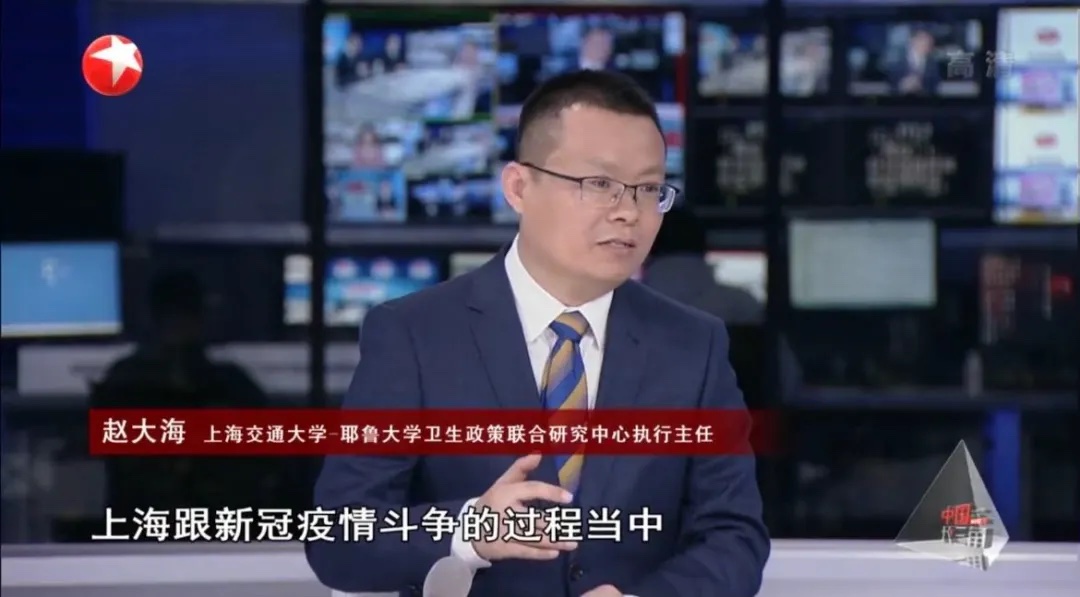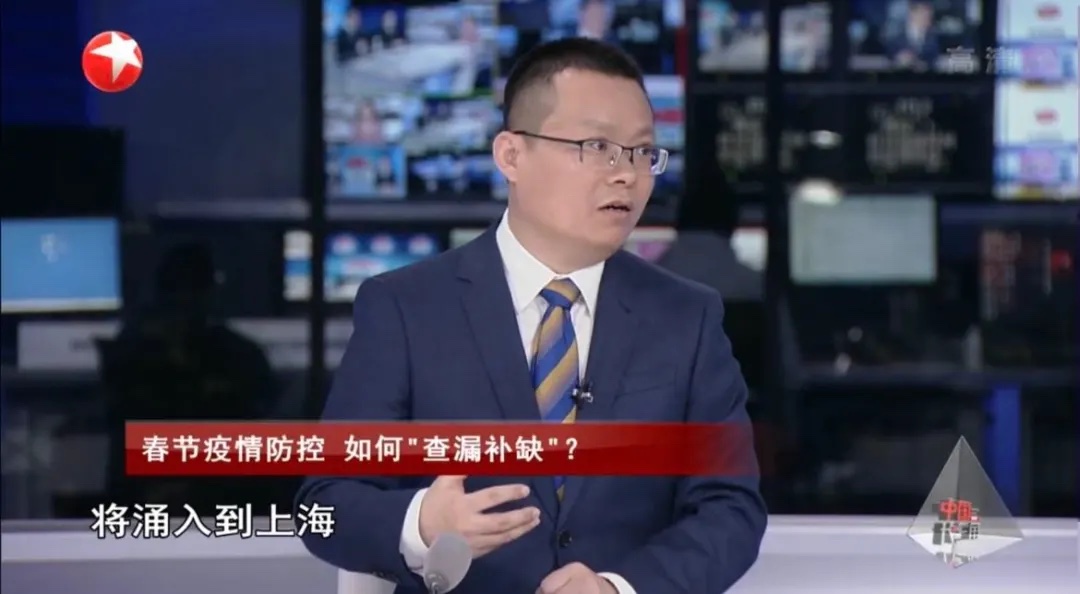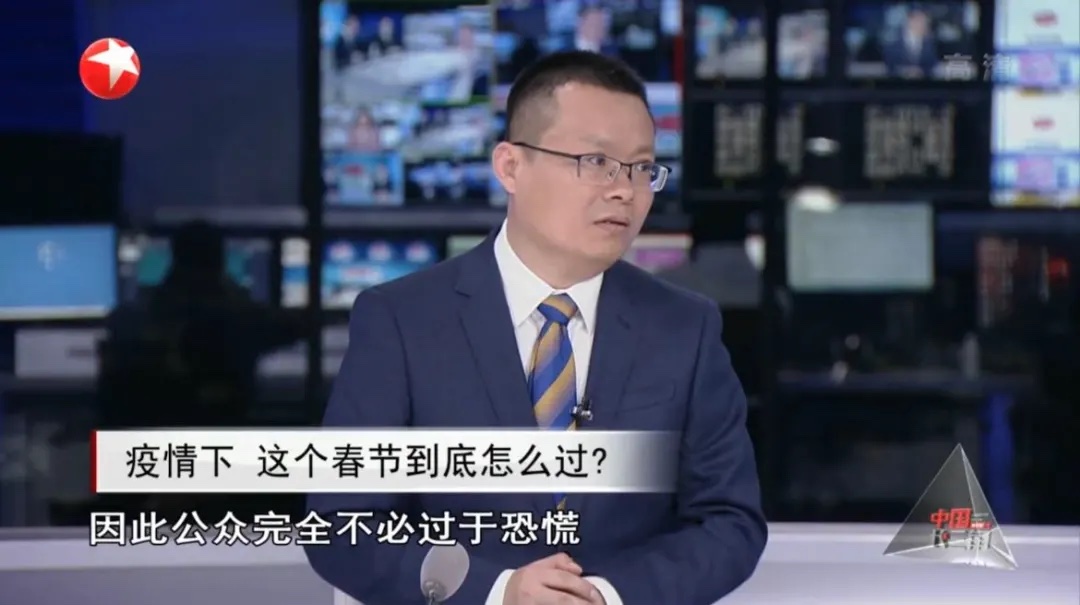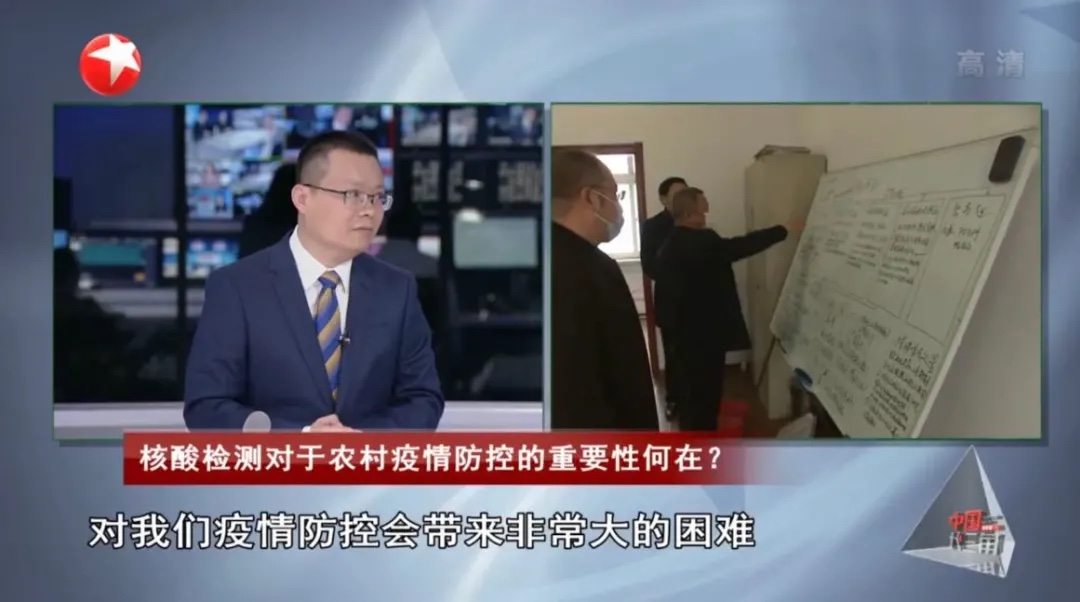上海交大赵大海做客东方卫视演播室:科学落实新冠疫情防控与欢度春节完全可以共同实现

上海交通大学国际与公共事务学院教授、博士生导师,上海交通大学-耶鲁大学卫生政策联合研究中心执行主任赵大海,自新冠肺炎疫情暴发以来,对于新冠疫情暴发、防控以及卫生政策第32次接受上海电视台专访,也是第82次接受央视、上视专访。2021年2月7日,赵大海做客东方卫视演播室,在《中国长三角》节目,就新冠疫情下,这个春节怎么过,如何做好“查漏补缺”让大家过个安心年,以及返乡出行如何做好行程评估等春节期间的新冠疫情防控话题进行了访谈。演播室另一位嘉宾是上海市公共卫生临床中心医务部主任沈银忠。现仅将有关赵大海的访谈内容摘录如下。

主持人何婕:上海这段时间的疫情防控用的是“总体风险可控”这样一种说法,上海的这种信心在您的观察中来自于哪里?
赵大海:上海与新冠疫情斗争的过程当中,已经探索出了一套比较成熟的疫情防控模式。也就是说,即便未来再有新的新冠病例的散在暴发,我们也可以在最短的时间之内,甚至可以说是在第一时间之内,主动找到新冠病例。而且可以在第一时间切断传播途径,甚至可以不需要大面积的采取封闭封锁的这种办法。

主持人何婕:这周一在上海疫情防控领导小组的会议上也专门提出一个概念,就是下一阶段我们尤其春节期间防疫的重点叫做“查漏补缺”,那您给我们解读一下这个“漏”和“缺”它代表的是什么?
赵大海:在春节这个特殊的时间段,因为不可避免有比较大量的流动人口将涌入到上海,如果有潜在的新冠感染者,我们尽可能在入口关就主动找到。除此之外,我们还需要在主动检测方面进一步来完善各项机制。

主持人何婕:也就是说一方面关口要把的再牢一些,另外一方面,主动筛查我们可以更主动一些,或者这个网可以织得更加的严密一些。
赵大海:有一点我想补充一下,现在我们对于新冠患者出院之后的集中隔离或居家隔离21天之后,甚至一个月之后,我们不敢说100%没问题了。有可能在一个月之后还有复阳的可能,还是需要动态的、在一定时间之内进行管理,同时跟我们集中隔离进一步衔接起来。
主持人何婕:另外还有个话题,前段时间,新闻也陆续爆出,比如说冷链送过来的车厘子,还有我们山东本地产的奶枣都检出有一些新冠病毒的存在,春节期间难免要买年货,从健康防疫的角度怎么去科学理解这件事儿?
赵大海:新冠肺炎本身是靠呼吸道传播的,那我们到目前为止,没有发现通过消化道而被感染新冠肺炎的报道。因此,公众完全不必过于恐慌。
主持人何婕:如果要出行的话,最重要的是要做一个行程评估,所以听听赵主任,您觉得行程评估包括哪些内容?
赵大海:行程评估应该讲是非常简单,主要是做好三个点,出发地、目的地和途经地这三点的评估就好了。如果出发地和目的地,这两个当中只要有一个现在还处于中高风险地区的话,那我们还是强烈建议不要出行。即便出行,我们在交通工具的选择方面,在短途的话,我们建议还是自驾行;如果是自驾行比较难以做到的话,也尽可能减少交通枢纽之间的中转,尽量减少暴露。
主持人何婕:我们也注意到,特别强调返回农村地区的,恐怕这个核酸检测报告是一定要做的,这个原因又在哪里?
赵大海:在城市地区,特别是在疫情防控追踪密切接触者的过程当中,我们主要采用的还是大数据的方式。但是在农村地区,我们就比较难以采用大数据的方式来追踪密切接触者。一旦在农村地区,有了新冠患者,那可能在比较短的时间之内就造成比较大的局部暴发,对我们疫情防控会带来非常大的困难。
主持人何婕:不要觉得我做个核酸检测报告挺麻烦,其实很重要。我这里提供一个最新的调查,是来自于新华网的,它这个调查显示呢,有八成的受访者他们不单是想知道返乡的要求,还想知道返乡之后返岗的防疫要求。
赵大海:这个完全依赖于在春节之后各地的疫情防控形势。如果在春节前后,我们各地的疫情防控形势相差不大,比如说绝大部分地区依然是低风险地区,那么我相信,返乡之后疫情防控的要求不会有太大的变化;但如果春节之后的地区由低风险转变为中高风险地区,那么返回工作岗位的防疫要求一定会有比较大的改变。
主持人何婕:那其实不管是返乡还是就地过年,大家都会面临一个问题,这个春节到底该怎么过?
赵大海:对于全国总体的疫情防控形势而言,应该讲还是比较严峻的,特别是在春节期间,有一个非常大的人口流动。在这个前提下,疫情防控依然是首要的。如果去饭店里边吃饭的话,应尽可能按照疫情防控的要求;一些比较大的旅游景点需要对于游客的人数进行限制。
主持人何婕:也就说还是要有一个优先顺序,但是两者并不矛盾,我们可以完全把两件事情同步做好。
供稿者:国务学院
日期:2021年1月28日
Dahai ZHAO’s Exclusive Interview with ShanghaiTV: It's implementable to working together on the scientific management of epidemic prevention and control and the Spring Festival celebration
Dahai Zhao, a doctoral supervisor at the School of International and Public Affairs of Shanghai Jiao Tong University and Executive Director of Shanghai Jiao Tong University-Yale University Joint Research Center for Health Policy, has been interviewed by ShanghaiTV for the 32st time (the 82st time by CGTN / ShanghaiTV) since the COVID-19 pandemic. On February 7, 2021, Zhao commented on the “under the epidemic, how to spend the Spring Festival, how to do a good job of "leak filling" so that everyone have a peace of mind, and how to do a good job of travel assessment during the Spring Festival" on “Yangtze River Delta, China” of Shanghai TV. Another guest is Shen Yinzhong, Director of the Medical Department of Shanghai Public Health Clinical Center.
Anchor (HE Jie): Shanghai's epidemic prevention and control in recent years is based on the saying that "the overall risk is controllable". Where does Shanghai's confidence come from in your observation?
Zhao Dahai: In the process of fighting the epidemic, Shanghai has explored a set of relatively mature epidemic prevention and control mode. That is to say, even if there will be sporadic outbreaks of new cases in the future, we can also actively find new cases in the shortest time, or even in the first time. And it can cut off the transmission route in the first time, even without the need for a large area of closure and blockade of this method.
HE Jie: At the meeting of the Shanghai epidemic prevention and control leading group on Monday, a concept was put forward, that is, the key point of epidemic prevention in the next stage, especially during the Spring Festival, is "missing" and "weakness". Could you please explain to us what the "missing" and "weakness" mean?
Zhao Dahai: During the special period of the Spring Festival, it is inevitable that a large number of floating population will flood into Shanghai. If there are potential new cases, we will try our best to find them at the entrance. In addition, we need to further improve the mechanisms in terms of active detection.
HE Jie: That is to say, on the one hand, the pass should be tightened, on the other hand, we can be more active in the screening, or the network can be woven more tightly.
Zhao Dahai: One thing I would like to add is that now we can't say that 100% of patients with new coronary disease will have no problem after 21 days of centralized isolation or home isolation after discharge. It may be possible to recover the sun after a month, but it still needs to be managed dynamically and within a certain period of time, and at the same time, it will be further connected with us in centralized isolation.
HE Jie: In addition, there is another topic. Some days ago, the news also broke one after another. For example, the cherries sent by the cold chain, and the milk jujube from Shandong province have been detected with the existence of some novel coronavirus.
Zhao Dahai: COVID-19 itself is transmitted by respiratory tract, so so far we have not found any reports of COVID-19 infection through digestive tract. Therefore, the public should not panic at all. If you want to go on a trip, the most important thing is to make a trip assessment.
HE Jie: So listen to Director Zhao, what do you think is included in a trip assessment?
Zhao Dahai: Trip evaluation should be very simple, mainly to do a good job in the three points of departure, destination and route of the assessment of these three points. If either source or destination is currently in a medium-high risk area, we strongly recommend not to travel. Even if travel, we in the choice of means of transportation, in short distance, we suggest or drive; If it is more difficult to do, reduce the transit between traffic hubs as far as possible, as far as possible to reduce exposure.
HE Jie: We have also noticed that special emphasis is placed on returning to rural areas. I am afraid that the nucleic acid test report must be done. What is the reason?
Zhao Dahai: In urban areas, especially in the epidemic prevention and control and tracking of close contacts, we mainly use big data. But in rural areas, it's harder to use big data to track close contacts. Once there are newly diagnosed patients in rural areas, it may cause a relatively large local outbreak in a relatively short period of time, which will bring great difficulties to the prevention and control of the epidemic.
HE Jie: Don't think it's troublesome for me to do a nucleic acid test report. It's actually very important. Here is a recent survey from Xinhua, which shows that 80% of respondents not only want to know the requirements for returning to their hometowns.They also want to know the requirements for returning to their hometowns.They also want to know the requirements for epidemic prevention.
Zhao Dahai: It all depends on the situation of epidemic prevention and control after the Spring Festival. If, before and after the Spring Festival, there is not much difference in the situation of epidemic prevention and control in our regions, for example, most of the regions are still low-risk areas, then I believe that the requirements of epidemic prevention and control will not change much after I return home. But if the area after the Spring Festival from low risk to high risk areas, then the return to work of the epidemic prevention requirements will have a relatively big change.
HE Jie: In fact, no matter whether you go back to your hometown or celebrate the Spring Festival, everyone will face a question, that is, how to spend the Spring Festival on earth?
Zhao Dahai: In terms of the overall situation of prevention and control of the epidemic, it should be said that it is still quite serious, especially during the Spring Festival, when there is a large population movement. In this context, epidemic prevention and control remains the top priority. If you go to restaurants, you should follow the requirements of epidemic prevention and control as far as possible. Some of the larger tourist attractions need to limit the number of visitors.
HE Jie: In other words, we still need to have a priority, but the two are not contradictory. We can do the two things at the same time.
Contributor: SIPA, SJTU
Date: February 8, 2021

